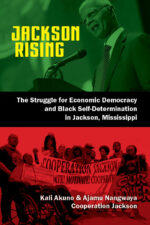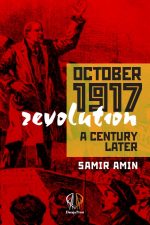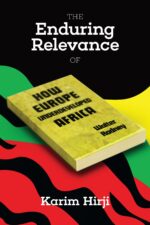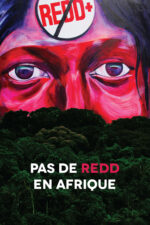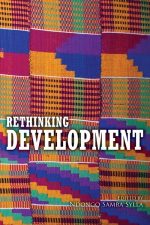-
dispossessed: poetry of innocence, transgression and atonement
Dispossessed is a poetic representation of life in three stages through the eyes of a poet. It shows, from the thematic interests of the poet; what he considers the crucial stages in life – Innocence, Transgression and Atonement.
Innocence offers a racy view of the picture gallery of the poet’s life as a child. The sensibilities of the poet shine through the foliage of his mind as he pines for self-definition; seeking open ears for his verses. But it is also a period of apprenticeship as the poet hones his skills for the artistic long journey that is inevitable. Clothed in the innocence of childhood, he learns to talk in metaphors and search for himself in the community of imaginative people. This search lights up the path into the poet’s aesthetic mindscape and the silent questions that keep him awake. Innocence is therefore a thirst for sunlight; a quest for utterance.
The unwary reader is beckoned into the quest through poems that evoke memories of their own childhood and conscript them into the ensuing communal experience. However, the human condition abhors inertia. But for any form of natural or artistic growth to occur, the poet must lose his innocence. So, Innocence and its poems of idyllic childhood soon give way to the unexpected — Transgression. Transgression is the coming of age segment of the collection. The poet discovers love. And slowly, he finds himself taking a dip in a pool of emotion that appears to serve as the ultimate sparkplug for his songs.
In essence, Transgression eases the reader into a rare observatory; from where the poet could be seen falling in and out of love and celebrating one of the most profound experiences known to man. It must be noted that in some instances, the love poems of Transgression are also not what they seem on the surface. In some instances, the poet addresses his troubled relationship with his country through poetry; mirroring his personal frustrations and disappointment in verses that come off as a voice of disenchantment. Caught in the firm grip of emotions, the poet changes like the English weather.
But after waves of emotional whirlwinds in Transgression, the poet faces the next logical step — Atonement. Atonement presents a poet who has undergone the rites of passage and weaned himself of self-doubts. He has washed his hands clean and must settle down to a fireside dinner with the elders. But as it turns out, the poet is not only seeking the ears of his genealogical ancestors and elders; he is also seeking the counsel of serious poets, past and present whose nod he needs to take on the weighty issues of his time. So, he comes with a “fistful of kolanuts” as is customary with his people who supplicate their elders and ancestors with kolanuts. In gaining entry into this conclave of his biological and artistic ancestors, he acquires the aesthetic authority to ask weighty questions about the world around him. He is incensed by what assails his sensibilities; a world that turns a blind eye to injustice and a humanity that needs an open heart surgery.
Atonement could also be seen as the poet’s personal admission that serious poetry ought to speak to the dominant issues of the day; the anxieties and insomnia of the age. He muses about these issues; posing rhetorical questions in about them in some instances.
In the end, dispossessed is one man’s journey that finally assumes all the attributes of a communal voyage. Treading in the imagined interstices between the personal and the communal, dispossessed leads us to a clearing in the woods where our awareness of our world heightens with the turning of every page.
James Eze was born in Enugu, southeast Nigeria, shortly after the Biafran War. He was the pioneer Literary Editor of Sunday Sun. As Head of External Communications at Fidelity Bank, he worked in partnership with the novelist Chimamanda Adichie to begin her popular International Creative Writing Workshop series. He is the curator of Under African Skies which hosts A Flutter in the Woods; a yearly evening of poetry and songs in Awka, Anambra State. He also co-founded The Return to Idoto, a poetry festival in honour of Christopher Okigbo. His poems have appeared in Camouflage: Best of Contemporary Writing from Nigeria.
-
Poems for the Penniless
These poems by Issa Shivji, lawyer, activist and Tanzanian public intellectual, were written at different times in different circumstances. They give vent to personal anguish and political anger. Mostly originally written in Kiswahili, here accompanied by English translations, and they are intensely personal and political.
Poems are clustered under several headings to provide a context. The first combines personal agony at the loss of comrades and friends with poems about love and affection for living ones. The second is about robberies of freedom, resources, and dignity and the loss of justice under neoliberalism. The third section, entitled Hopes and Fears, comprises short poems tweeted over the last five years expressing despair, fear and hope in the human capacity for freedom.
The last section are poems, concerned with Shivji’s period in South Africa in 2018, reflect on the emergence of neo-apartheid with its wanton and shameless exploitation of the majority.
Wonderfully translated by Ida Hadjivayanis.
-
Silence Would Be Treason: Last writings of Ken Saro-Wiwa (Expanded 2nd Edition)
Edited by Íde Corley, Helen Fallon, Laurence Cox
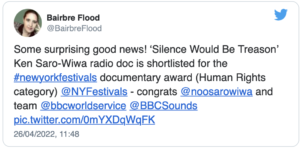
Recent tweet about good news of the radio documentary on Silence Would Be Treason being shortlisted for the #newyorkfestivals documentary award (Human Rights category). Congrats to @noosarowiwa et al. These letters and poems are invaluable fragments of a living conversation that portrays the indomitable power in humans to stay alive in the face of certain death – to stay alive even in death.
Reading through the treasure trove of the letters and poems compiled here as The Last Writings of Ken Saro-Wiwa evokes intense memories of his resolute struggles against an oil behemoth and a deaf autocratic government. His crusade frames one of the most tumultuous periods of Nigeria’s history; his tragic story evokes anger and demands action to resolve the crises that first led the Ogoni people to demand that Shell clean up Ogoni lands or clear out of the territory.
I
-
Transcending our Colonial Place: Africa and the dialectics of emancipation
Fanon exhorted us (his posthumous comrades) to abandon Eurocentric thinking and to reconnect with dialectical thought in order as he puts it to “work out new concepts” and he insisted that “if we want humanity to advance a step farther […] then we must invent and we must make discoveries”. I propose to take Fanon at his word and to return to the dialectic as subjective thought rather than as motion of history; as a specific political subjectivity rather than as an objective development. Dialectical thought should be considered as the core feature of any politics of emancipation, a politics that is founded on what is common to humanity, an egalitarian alternative to the existing neocolonial racist capitalist organisation of society.
This book seeks to outline and assess the thinking of emancipatory politics in Africa as it changed in different historical periods. It also contrasts such politics to state political subjectivities which, by their very nature, reproduce given social placements or stated differently the allocation of people to hierarchical locations in society. Emancipatory politics always affirms a rejection of the place allocated to the oppressed and therefore contradicts and transcends the regular state subjectivities embodied in culture which ultimately attempt to justify such placement. Emancipatory politics is exceptional and therefore rare, and it is dialectical because it combines in a contradictory manner the culture of placement from which it emanates with the idea of universal freedom.
Dialectics is not the affirmation of historical necessity; it is a subjective political possibility opposed to (neo)colonial capitalism which has relegated the majority of our population to conditions of perennial impoverishment, oppression and gradual alienation from any Idea of being Human. This work illustrates the fact that dialectical thought has existed in Africa over millennia, with its earliest manifestation being in Ancient Egypt. The text also draws on the universalist content of African proverbs to show the possible dialectical content of African modes of thought, illustrating the emancipatory potential already in existence in some African cultures.
The contemporary attempts at achieving freedom on the African continent – the liberation struggles of the twentieth century – failed fundamentally because they rapidly abandoned any idea of universal humanity and held that emancipation was to be achieved through the medium of the state. It was the desire of the oligarchy that inherited independence to be accepted and integrated into the global capitalist economy for the purposes of state-led ‘development’. The effect, after a short nationalist interlude, was not an inclusive form of ‘nation-building’ but rather the building of a neocolonial state by a Western-oriented oligarchy unable or unwilling to meet the basic needs of its own people. To succeed in this endeavour, the newly independent state retained many oppressive features of its colonial predecessor remoulding them to suit its needs. The book shows how in an overwhelmingly neocolonial context, it is of little consequence to the oppressed masses in Africa whether their political system is formally labelled as ‘democratic’ or not. In fact, given the endemic corruption among the oligarchies in power, military dictatorships can garner mass popular support for shorter or longer periods if they are seen to resist (however mildly) neocolonial domination. The recent examples (early 2020s) of proto-nationalist military coups in Francophone West Africa (Guinea, Mali, Burkina Faso and Niger) are cases in point.
This book develops theoretical arguments that redirect intellectual thought away from Euro-American liberal conceptions as well as from neo-nativist fashions and vulgar Marxisms, so as to reassert the importance of latent ‘African potentials’ that are frequently embodied in collective popular statements for rethinking, dialectically, a true politics of emancipation on the African continent.
1) the Ancient World: Ancient Egypt (The Tale of the Eloquent Peasant – 4000 BCE) and Plato (as read by Alain Badiou);
2) Pre-colonial Africa and resistance to slavery: the Donsolu Kalikan (in the Manden/Mali, 1222), the Antonian Movement (in Kongo, 1684-1706) and its continuation in the Lemba Movement, and the Haitian Revolution (undertaken by slaves from Africa),
3) The National Liberation Struggles of the 1960s as thought by Fanon and Cabral, and
4) The mass popular struggles in South Africa during the 1980s.
-
Jackson Rising: The Struggle for Economic Democracy and Black Self-Determination in Jackson, Mississippi
Mississippi is the poorest state in the U.S. with the highest percentage of Black people and a history of vicious racial terror. The concurrent Black resistance is the backdrop and context for the drama captured in the collection of essays that is Jackson Rising: The Struggle for Economic Democracy and Black Self-Determination in Jackson, Mississippi. The long-awaited release of this seminal anthology will unveil the strategies and methods being pursued by this ongoing movement for Black community control and people-centered economic development.
“Jackson Rising is an exploration of our experiment in radical social transformation and governance that is directly challenging the imperatives of neoliberalism and the logic and structures of the capitalist system in Jackson and beyond.”
—Kali Akuno of Cooperation JacksonUndeterred by the uncertainty, anxiety and fear brought about by the steady deterioration of the neoliberal order over the last few years, the response from radical activists in Jackson, Mississippi has been to concentrate on building a radical anti-capitalist alternative from the ground up. Inspired by the rich history of struggle and resistance in Mississippi and committed to the vision of the Jackson-Kush Plan, these activists are building institutions rooted in community power that combine politics and economic development into an alternative model for change, while addressing real, immediate needs of the people.
The experiences and analyses in this compelling collection reflect the creative power that is unleashed when political struggle is grounded by a worldview freed from the inherent contradictions and limitations of reform liberalism. As such, Jackson Rising is ultimately a story about a process that is organized and controlled by Black working people who are openly declaring that their political project is committed to economic democracy and radical participatory governance.
“Jackson is rising and emerging as a model for resistance and visioning beyond the challenges of the present. It stands as the dynamic counter to economic redundancy, political marginalization, and systematic state violence.”
—Ajamu Baraka, National Organizer, Black Alliance for PeaceJackson Rising contains contributions from well-known community activists and organizers Hakima Abbas, Kali Akuno, Ajamu Baraka Thandisizwe Chimurenga, Kamau Franklin, Sacajawea Hall, Rukia Lumumba, Ajamu Nangwaya, Max Rameau, Makani Themba, and Jazmine Walker and Elandria Williams, as well as noted journalists and academics including Sara Bernard, Carl Davidson, Bruce A. Dixon, Laura Flanders, Katie Gilbert, Jessica Gordan-Nembhard, Michael Siegel, and Bhaskar Sunkara.
Cooperation Jackson is building a solidarity economy in Jackson, Mississippi, anchored by a network of worker-owned, democratically self-managed cooperative enterprises.
Chris Hedges and Kali Akuno on the Gentrification of Jackson, Miss. (Video)
Mississippi, USA: An Interview with Kali Akuno by Cat Brooks on KPFA’s UpFront
Jackson Rising: At Last, a Real Strategic Plan→By Richard Moser, Black Agenda Report
Left Out, a podcast produced by Paul Sliker, Michael Palmieri, and Dante Dallavalle, creates in-depth conversations with the most interesting political thinkers, heterodox economists, and organizers on the Left. In this episode, we sat down with Kali Akuno — the co-founder and co-directer of Cooperation Jackson.
Real Change
“...the effort in Jackson is an inspiration and evidence of what can be done in the poorest of communities to mobilize, educate, and organize a counterweight to predatory capitalism and White supremacy.
“Jackson Rising” is also a call for help. The vision of “solidarity economics” means making links outside of Jackson and creating alternative economic relationships that can help worker- and consumer-owned businesses survive the blows of everything from business downturns to overt political repression. In Mississippi, the stakes couldn’t be higher.
“And given the national need to turn so-called red states in a progressive direction, Cooperation Jackson could be one beginning.”
-
You’re Not Here
One brother goes missing in action in Afghanistan, the other falls in love with an Afghan girl in England.
Bitter divisions engulf an English town where young Muslims oppose the British army’s presence in Afghanistan, whilst white youth condemn the Muslims as traitors.
To the disgust of his white friends, 17-year-old Jake Marlesden, whose brother is missing in action in Afghanistan, is in love with Leila Khan, an Afghan. When Jake tries to find out what happened to his brother, neighbour turns against neighbour and lover against lover.
Leila joins young Muslims protesting against the returning bodies of dead British soldiers, and Jake stands with the families of the soldiers. The lovers fall apart.
But far off events, and sinister forces at home, bring the lovers together again in a journey in which they will not only discover themselves, but also heal the wounds of their families and friends.
This is the sequel to You’re Not Proper.
Set in and around Manchester, You’re Not Here is informed by Mehmood’s experience of growing up a working class Pakistani in northern England, combatting racism on the streets and being arrested. The novel explores the British Asian experience in the context of the “war on terror” and Islamophobia. “I have lived and fought against various waves of racism in Britain, but the current Islamophobic one, the new racism, is far more insidious and divisive than those which preceded it,” says Mehmood in his blog.
This novel is a sequel to You’re Not Proper, which explored, in the author’s words, “what it is to be a Muslim teenager in the west today”. While it featured two teenage women’s search for identity and belonging — one with a Pakistani father and white Christian mother, the other her Hijab-wearing school friend — Mehmood’s sequel is, interestingly, told from the point of view of a white working class British youth.
Jake’s father was in the army. His elder brother is missing in action in Afghanistan. Jake is in love with a Muslim girl. We are introduced to diverse Asian characters and to white racist friends of his brother, and to the tensions both within and between the two communities, through Jake’s eyes.
While the novel reads like a pacey thriller, the teenage love story is treated with convincing tenderness. And there is sympathy for British soldiers. One scene features physically and mentally scarred ex-soldiers discarded by the state, and Military Friends and Families Against War make an appearance.
http://socialistreview.org.uk/438/youre-not-here
The narrative is packed with authentic voices, often humorous observations and insights, The novel reads like a thriller. It reaches an action-packed and moving climax, but, unlike a thriller, we are left uneasy about what may happen next.
Helen Goodway, Red Pepper, Summer 2019 -
October 1917 Revolution: A century later
Great revolutions make history. Conservative resistance and counter-revolutions only delay their progress. The French revolution invented modern politics and democracy, the Russian revolution paved the way for the socialist transition, while the Chinese revolution connected the emancipation of those peoples oppressed by imperialism with the path to socialism. These revolutions are great precisely because they are bearers of undertakings that are far ahead of the immediate demands of their time. beacons that illuminate the still unfinished struggles of the peoples for the realization of these goals. It is impossible to understand the contemporary world by ignoring these great revolutions. To commemorate these revolutions, says Samir Amin, one needs both to assess their ambitions (the utopia of today will be the reality of tomorrow), and to understand the reasons for their temporary setbacks. Conservative and reactionary minds refuse to do so—they wish us to believe that great revolutions have been nothing more than unfortunate accidents, that the peoples who have made them were carried away by their deceitful enthusiasm, diversions from the normal current of history. This collection of essays helps to situate the lessons of the October 1917 Russian Revolution from a perspective of 100 years.
Egyptian economist and intellectual, Samir Amin (1931-2018), was one of the world’s greatest radical thinkers —a creative Marxist’. He was the director of Third World Forum (Forum du tiers monde), Dakar and President of the World Forum for Alternatives. He published numerous books and papers, including The Law of Value and Historical Materialism, Eurocentrism – Modernity, Religion and Democracy: A Critique of Eurocentrism and Culturalism, Ending the Crisis of Capitalism or Ending Capitalism?‘, Global History – a View from the South and Russia and the Long Transition from Capitalism to Socialism
-
Cradles
Valiani has written a beautiful and insightful book of poetry about the birthplace of humanity; ‘the cradle of civilization’, Africa. The poems are gathered into four sections: “Womb”; “Land(s)”; “Tides”; “Wind”. Each section is prefaced by philosophy, findings and artifacts of “Maropeng” which becomes both subject and predicate for this soothing poetry: a lullaby for the soul’s remembering. Candice James Poet Laureate Emerita of New Westminster
Cradles is a collection poems on the nature(s) and nurturing that cradle us. They are divided into four parts: Womb is the first cradle, both ‘nature’ and ‘nurture’, under-acknowledged and often unmentioned. Beyond the physical womb of individuals, there are collective wombs that incubate on yet grander and greater scales. Land(s) are the cradles we typically identify as our ‘origins’, but as the Cradle of Humankind teaches, the many lands of today are interlaced in many concealed ways and originated in a single, little understood place. Tides are the many migrations and cycles of time that shape us. They can shift, upset and remake the nurturing of cradles; but also cradle us in cycles of wreckage. Wind sets us free of places and times of origin. This detachment can bring freedom, a sense of loss/lostness, and the many things in between. The freedom/loss/lostness spiral whirls with the wind and transforms. In surrendering to it we can alter its pace to our needs and desires.
-
Citizenship, Identity and Belonging in Kenya
This book examines citizenship, identity and belonging in Kenya through an analysis of literature, film, music, and theatre. Reflections on women, statelessness and refugees are central considerations.
-
The Enduring Relevance of Walter Rodney’s ‘How Europe Underdeveloped Africa’
Soon after its publication in 1972, Walter Rodney’s How Europe Underdeveloped Africa gained global popularity among students, scholars, activists and people concerned with African affairs. His innovative application of the method of political economy transformed the paradigm for rendition of the continent’s past. Because it stridently took the traditional historians and the prevailing neo-colonial order to task, it was also pilloried by the defenders of the status quo. And, in these neoliberal times, mainstream scholars and pundits proclaim that it is no longer relevant for Africa.
In Walter Rodney: An Enduring Legacy, Karim Hirji makes a systematic case that, on the contrary, Rodney’s seminal work retains its singular value for understanding where Africa has come from, where it is going, and charting the path towards genuine development for its people. After giving a broad picture of Rodney and his times, Hirji examines in detail the criticisms levelled against his work, and conducts a focused review of modern day textbooks on African history. It is seen that most of the claims against Rodney lack a sound basis and that direct representations of his ideas are replete with distortions, unfair selectivity and political bias. Yet, the long term influence of Rodney on African history is unmistakable.
Hirji’s succinct, coherent defence of an intellectual giant who lived and died for humanity is an essential read for anyone with an interest in Africa and related regions.
You can read this book online for free.
Soon after its publication in 1972, Walter Rodney’s How Europe Underdeveloped Africa (HEUA) gained global popularity among progressive students, scholars and activists, and people concerned with African affairs. His innovative application of the method of political economy was a prime contributor to shifting the paradigm for rendition of the continent’s past as well as for visualizing its possible trajectory. Because it stridently took the traditional historians of Africa and the prevailing neo-colonial order to task, it was also vociferously criticized by the defenders of the status quo.
In these neoliberal times, its visibility has waned. Mainstream scholars and pundits from and outside of Africa proclaim that it is no longer a relevant work for Africa. In Walter Rodney: An Enduring Legacy, Karim Hirji makes a systematic case that, on the contrary, Rodney’s seminal work retains its singular value for understanding where Africa has come from, where it is going, and charting a path towards genuine development for the people of Africa.
Hirji considers Rodney in his unitary persona as a historian, theoretician and activist. He begins by outlining the publication history and contents of HEUA, and noting the comments it has drawn from varied quarters. This is followed by a depiction of the global context within which it saw the light of the day and the flowering of progressive thought and vision in those vibrant times. The retrogressive reversal, in thought and social reality, that has transpired since then is summed up next. An assessment of how HEUA has weathered this storm is also provided.The next chapter presents a brief portrait of Rodney as a revolutionary, with the focus on his seven years at the University of Dar es Salaam. This is followed by an overview of the methodological framework utilized in HEUA.
These five chapters lay the foundation for the main substantive part of Hirji’s book. This part begins with a detailed evaluation of the criticisms that have been levelled at HEUA. Subsequently, by a review of eight textbooks of general African history in common use today is provided. The aim here is to assess the persistence, if any, of ideas of the type promoted by Rodney in such books and identify the manner in which HEUA is directly depicted therein. Do these books give an adequate and fair depiction of Rodney to modern day students?
The penultimate chapter argues for the continued relevance of Rodney and his seminal text for Africa (and the world) in this anti-people, pro-capital, pro-imperial neoliberal era. Hirji concludes with a lively account of his own interactions over six years with Walter Rodney. With the focus on the issue of building socialism in Tanzania, a key dimension in the evolution of Rodney’s thinking is described in a critical spirit. The fundamental question addressed is, in our often dark, demoralizing political environment, what do Rodney and his life have to teach us on the matter of navigating between hope and struggle?
The conclusion emerging from this book is that in the first place most of the criticisms of the content, style and practical value of HEUA lack merit. The representation of Rodney in mainstream books is as well replete with distortions, unfair selectivity and political bias.
Despite these misrepresentations, Rodney and his ideas retain their signal value for understanding African history, for engaging with its present day conditions, and for projecting distinctive future scenarios for the continent. Hirji’s succinct work is a consistent, coherent defence of an intellectual giant, an astute historian and a compassionate revolutionary who lived and died for humanity. It is an essential read for anyone with an interest in African history, and the fate of Africa and the regions that are historically related to it.Walter Rodney: An Enduring Legacy
Karim F HirjiCONTENTS
Preface
1. The Book
2. The Global Context
3. A Grand Reversal
4. Rodney, the Revolutionary
5. Rodney and Historiography
6. Criticisms of the Book
7. Rodney in the Classroom
8. Contemporary Relevance
9. Hope and Struggle
Major Writings of Walter Rodney
References
Author Profile -
PAS DE REDD EN AFRIQUE
USD $ 10.00La présente publication du Réseau Pas de REDD en Afrique (No REDD in Africa Network) a pour but de démystifier le REDD, les projets de type REDD et toutes leurs variantes, et de montrer ce qu’ils sont vraiment : des mécanismes injustes conçus pour lancer une nouvelle phase de colonisation du continent africain. Les exemples présentés démontrent clairement que le REDD est une escroquerie et que les pollueurs savent qu’il leur permet d’acheter le « droit » de polluer.
-
Finding a Voice: Asian Women in Britain (New and Expanded Edition)
First published in 1978, and winning the Martin Luther King Memorial Prize for that year, Finding a Voice established a new discourse on South Asian women’s lives and struggles in Britain. Through discussions, interviews and intimate one-to-one conversations with South Asian women, in Urdu, Hindi, Bengali and English, it explored family relationships, the violence of immigration policies, deeply colonial mental health services, militancy at work and also friendship and love. The seventies was a time of some iconic anti-racist and working-class struggles. They are presented here from the point of view of the women who participated in and led them.
This new edition includes a preface by Meena Kandasamy, some historic photographs, and a remarkable new chapter titled ‘In conversation with Finding a Voice: 40 years on’ in which younger South Asian women write about their own lives and struggles weaving them around those portrayed in the book.
An amazing review of the book can be read here: https://librofulltime.wordpress.com/2023/03/03/book-review-amrit-wilson-finding-a-voice-asian-women-in-britain/
Here is an extract:
This book is a call to collective action and sisterhood, a memorial and an instruction to keep going. In her Reflections, Wilson points out White feminists need to let Asian women work on their own problems while standing in support, not intrude and try to sort their issues out for them, and the valuable material she gathers in this book is indeed because she was part of the communities she was studying, speaking to the women in their kitchens in their own languages. I was so pleased to be able to revisit this wonderful work. – Lix Dexter @LyzzyBee_Libro
A great interview with Amrit Wilson in Montreal Serai (October 4, 2020).
‘This book is a wonderful, important and necessary reminder of all the black feminist work behind us and all that is left to do.’ —Sara Ahmed, feminist writer and independent scholar, and author of Living a Feminist Life
‘Finding a Voice acquires a new significance in this neoliberal era…an indispensable archive as well as a narrative of a past that is not past but reactivated and recast…’ —Kumkum Sangari, William F.Vilas Research Professor of English and the Humanities, University of Wisconsin-Milwaukee
‘A ground-breaking book, as relevant today as it was in the seventies – and evidence, if ever such were needed, that the struggles of Asian, African and Caribbean women remain inextricably linked.’ —Stella Dadzie, founder member of OWAAD and author of Heart of the Race
‘Finding a Voice… was affirmation that our lives mattered, that our experiences with all their cultural complexities, mattered.’ —Meera Syal, British comedian, writer, playwright, singer, journalist, producer and actress.
‘This new edition comes at a time…when we are experiencing the growth of the surveillance state and when our narratives are being co-opted and used against us. Finding a Voiceis not only welcome, it is necessary.’ — Marai Larasi, Director, Imkaan; Co-Chair of UK’s End Violence Against Women Coalition.
Amrit Wilson is a writer and activist on issues of race and gender in Britain and South Asian politics. She is a founder member of South Asia Solidarity Group and the Freedom Without Fear Platform, and board member of Imkaan, a Black, South Asian and minority ethnic women’s organisation dedicated to combating violence against women in Britain. She was a founder member of Awaz and an active member of OWAAD. She is author, amongst other books, of Dreams Questions Struggles—South Asian women in Britain (Pluto Press 2006) and The Challenge Road: Women and the Eritrean revolution (Africa World Press 1991). The first edition of Finding a Voice: Asian Women in Britain won the the Martin Luther King Jr award.
It is the impact of oppression, racism and class which unifies South Asian women and the book comes at a time where we see the continued rise of the far right, misogyny, issues of class and the gig economy here and across the globe being played out in the media and perpetuated by male leaders going unchallenged by the state.
These new voices confirm how groundbreaking the book has been as a reference point for south Asian women now through listening to the voices of women from four decades ago, honouring their contribution and speaking in solidarity with them. As Wilson says in her introduction, it “reclaims our collective past as an act of resistance.”
An excellent read.
‘Reclaiming our collective past’: Amrit Wilson reflects on 40 years of anti-racist feminist work
By Sophia Siddiqui ARCHIVESPOLITICS 30th October 2018
http://gal-dem.com/collective-past-amrit-wilson-reflects-anti-racist-feminist-work/?fbclid=IwAR2qF13MA82F-9hztnRg4hN8ry5EEiZ2rYUtzX4OPuG7CELOzffhCTBjm4o -
Oil Politics: Echoes of Ecological Wars
The essays here contribute to developing and deepening an understanding of the ecological challenges ravaging Nigeria, Africa and our world today. They illustrate the global nature of these terrors. These essays are not meant just to enable for coffee table chatter: they are intended as calls to action, as a means of encouraging others facing similar threats to share their experiences.
Set out in seven sections, this book of 54 essays deals with deep ecological changes taking place primarily in Nigeria but with clear linkages to changes elsewhere in the world. The essays are laid out with an undergird of concerns that characterise the author’s approach to human rights and environmental justice advocacy. The first section rightly presents broad spectrum ecological wars manifesting through disappearing trees, spreading desertification, floods, gas flaring and false climate solutions.
You can read this book online for free.
The second section zeroes in on the different types of violence that pervade the oil fields of the Niger Delta and draws out the divisive power of crude oil by holding up Sudan as a country divided by oil and which has created a myriad of fissures in Nigeria. The exploitation of crude oil sucks not just the crude, it also sucks the dignity of workers that must work at the most polluting fronts.
Section three underscores the need for strict regulation of the fossil fuels sector and shows that voluntary transparency templates adopted by transnational oil companies are mere foils to fool the gullible and are exercises in futility as the profit driven corporations would do anything to ensure that their balance sheets please their top guns and shareholders. The fourth section builds up with examples of gross environmental misbehaviours that leave sorrow and blood in a diversity of communities ranging from Chile to Brazil and the United States of America.
Section five of the book is like a wedge in between layers of ecological disasters and extractive opacity. It takes a look at the socio-political malaise of Nigeria, closing with an acerbic look at crude-propelled despotism and philanthropic tokens erected as payment for indulgence or as some sort of pollution offsets.
The closing sections provide excellent analyses of the gaps and contortions in the regulatory regimes in Nigeria. It would be surprising if these were not met with resistance on the ground.
These essays provide insights into the background to the horrific ecological manifestations that dot the Nigerian environment and the ecological cancers spreading in the world. They underscore the fact there are no one-issue struggles. Working in a context where analyses of ecological matters is not the norm, decades of consistent environmental activism has placed the writer in good stead to unlock the webs that promote these scandalous realities.
-
Rethinking Development
USD $ 22.00Beyond the critique of neo-liberalism, there is therefore a pressing need to reflect about alternatives that will help Africa back out of this dead-end and find its own path. This is the perspective adopted by this book edited by Ndongo Samba Sylla, which compiles contributions of experts on Africa’s development issues. Can democracy help to achieve the changes that Africans aspire to? If yes, under what conditions? Otherwise, what is the alternative?

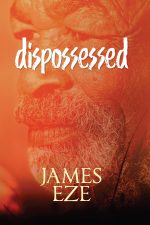
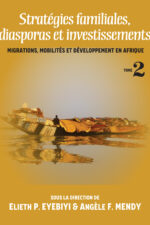
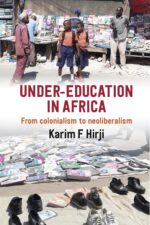
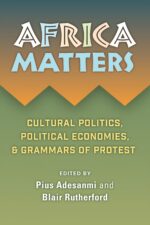




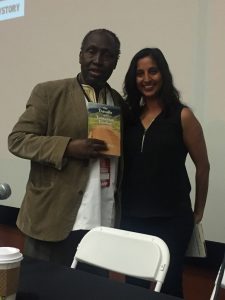 Ngũgĩ wa Thiong’o with Rosa Hirji, holding a copy of The Travails of a Tanzania Teacher i.
Ngũgĩ wa Thiong’o with Rosa Hirji, holding a copy of The Travails of a Tanzania Teacher i.
